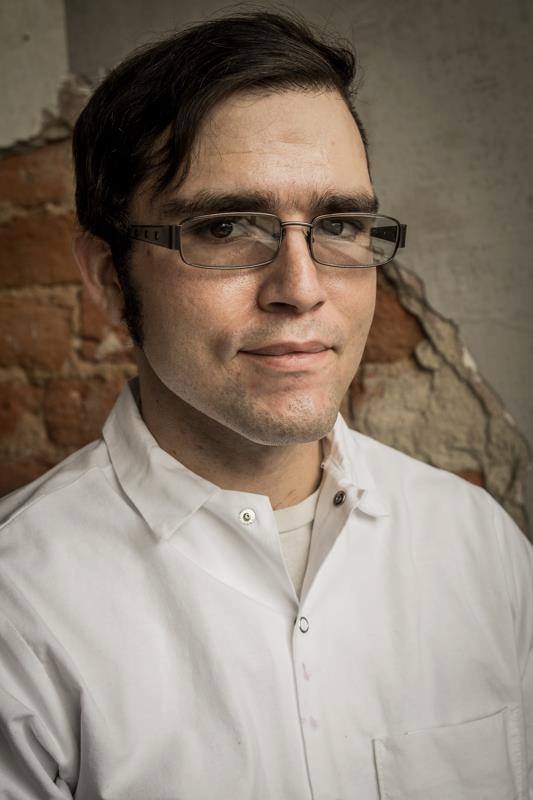“I really needed that steppingstone, that opportunity,” Robert Robbs says with a flash of his signature optimism. The opportunity to which he’s referring is GO Kitchen Ready, a program of Asheville nonprofit community-building organization Green Opportunities. Through a partnership with A-B Tech and the Asheville Independent Restaurant Association, GO offers this free, 15-week culinary training program to Asheville-area low-income adults looking for a second chance (and a ServSafe certification).
Since 2012, GO Kitchen Ready has hosted three training cycles annually, with each cycle instructing an average of 15 students. The program has an impressive success rate: In 2016, for example, 42 students enrolled in the program, and 79 percent of them (33) graduated. Of those students, 72 percent were employed within three months of graduation, the majority within the culinary/hospitality industry.
Executive chef instructor Gene Ettison notes that the job-readiness course can trigger a remarkable metamorphosis. Students who may enter the program jaded or broken from drugs, prison or plain bad luck leave a few months later with a ServSafe certification, 208 hours of culinary training, experiences with some of Asheville’s most lauded chefs and a foundation of culinary arts certification from A-B Tech. “These are people that come to us in active addiction, people that are homeless or in broken homes,” says Ettison, “and [they] ultimately land living-wage jobs and move on to even becoming managers and supervisors in their own right.”
Graduates of Kitchen Ready aren’t just equipped with skills and released into the wilds of Asheville’s kitchens; they’re offered support from case management specialists and guidance from program administrators like Ettison. “We actually watch students develop into mini-chefs with tons of eagerness to show the world what they have to offer, and I welcome their late-night phone calls for advice, letters of recommendation or just a quick hello,” he says.
Graduates who find success are always welcomed back as leaders and volunteers. Even students who don’t find analogous positions in the culinary field are still rigged with the know-how and — perhaps even more importantly — self-assurance to pursue other careers.
Empathy and compassion
“The GO program gave me my confidence back,” says Sharon Tobolski, who’s advanced quickly since graduating from the Kitchen Ready program in April 2015. She’s already cafe manager at City Bakery’s Charlotte Street shop. It’s the kind of job that requires fleet feet, quick wit and a deep reserve of patience — attributes Tobolski refined in the GO Kitchen Ready program. “I definitely learned patience and discipline and how to work effectively and successfully under pressure during our pop-up dinners,” she points out. “I believe that’s one of the major reasons I have excelled so fast in my current job and why I can handle superbusy and chaotic days at work — which is pretty much every day there,” she says.
The experience of the GO Kitchen Ready program itself is often intense and can pose challenges for students who have to balance its requirements with other responsibilities. “Had I been in the position I am now, where I have to work full time in order to survive, I would not have been able to attend GO,” Tobolski says. She points out that the program follows the schedule of a normal workday, meaning students have to find paying work at night or on weekends. “I feel like it would fit the working-class schedule better if there were evening classes, maybe weekends as well,” she says.
Although every student’s experience is different, Tobolski says the kindness and encouragement of the instructors is a constant. “I loved how all the staff there did not judge their students on what they have been through in their lives. They showed empathy and compassion to each and every one of us every day,” she says.
Beyond the kitchen
Not all GO Kitchen Ready grads find employment in the culinary field. “The things that they were teaching — networking, people skills — were very helpful for me,” says Robbs, a 2014 graduate of the program. When he started working at Facebook in Forest City, he immediately put those networking skills to good use. “I met a foreman over here, and he saw I knew a lot of things, and the doors began to open,” he explains. Now the company is investing in Robbs, sending him to school to specialize in HVAC technology so he can help maintain the facility’s air quality.
During the 16 years he was incarcerated, Robbs pursued a variety of degrees, including culinary. But at GO Kitchen Ready, he was able to turn his motivation into marketable skill sets. “I just needed an opportunity,” Robbs repeats again and again. For now, Robbs says he plans to keep rising through the ranks at Facebook. “But I love to cook,” he says, so in the future, he hopes to put his culinary skills to good use by perhaps a sports bar.
On the right path
“For me it was just the best experience I could have,” says Stephen Hammond, who works with chefs Joe Scully, Mike Cash and Josh Weeks at Chestnut, Corner Kitchen and Corner Kitchen Catering. Hammond’s entrée to the culinary world came after 20 years of farming and 17 years of addiction. Hammond says he always liked to cook but truly realized his passion for kitchen work during a stint in an Asheville rehab program. He graduated from Kitchen Ready last fall, and his long-term plan is to own his own restaurant or food truck within five to 10 years.
Hammond currently volunteers monthly with the Kitchen Ready program, plus he’s spearheading a new project. “I’m in the process of trying to start a community garden in one of Asheville’s Section 8 housing [communities],” he says with excitement. “I’m trying to get kids involved after school on Friday and Saturday, to do something positive in the community where there’s been a lot of negative.”
Sometimes the Kitchen Ready program lights the path a student was always meant to take. When Brit Castañeda applied to the Kitchen Ready program, he wasn’t really sure what he wanted to do with his life. “I had already tried a few semesters of A-B Tech’s electronics engineering program, but I was struggling with the math courses and eventually dropped out,” he says. “With GO, I was given the chance to focus and stay busy in the kitchen.”
And the kitchen, he discovered, was where he belonged. After leaving GO Kitchen Ready, he joined the culinary program at A-B Tech, where he’s now in his second year. He juggles his studies with time in the kitchen at Sky Lanes Bowling Alley. “Even though it’s a tiny kitchen, I’m always trying to improve and apply what I’m learning in school to my work.” He’s also putting together a business plan for his own restaurant.
Castañeda points out that the far-reaching impact of the program affects not just the students but all of Asheville through the community engagement encouraged through the Southside Kitchen meals. “Serving a diverse community seems to be in the center of a lot of what’s going on in Asheville,” says Castañeda when asked about his favorite part of the program. “With folks from public housing to politicians, it felt equalizing to be a part of GO.”
Ettison agrees that the program can inspire beyond the boundaries of the kitchen. “I wanted people, not just students, to see that no matter where you are in your life’s journey, with determination anything is possible,” he says.








Before you comment
The comments section is here to provide a platform for civil dialogue on the issues we face together as a local community. Xpress is committed to offering this platform for all voices, but when the tone of the discussion gets nasty or strays off topic, we believe many people choose not to participate. Xpress editors are determined to moderate comments to ensure a constructive interchange is maintained. All comments judged not to be in keeping with the spirit of civil discourse will be removed and repeat violators will be banned. See here for our terms of service. Thank you for being part of this effort to promote respectful discussion.